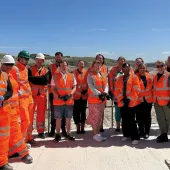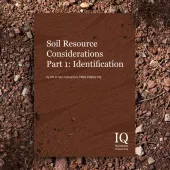Quarry Question Time Online
The second ‘Quarry Question Time’ organized by the Derbyshire Branch of the Institute of Quarrying was held last night (18 February) at the University of Derby on the theme of ‘Health, Safety and Environment within a Globalized Economy’.
The evening was chaired by Peter Huxtable, Secretary of the British Aggregates Association, with a panel of senior industry figures comprising: Cedric Hollinsworth, International Operations Director – Tarmac; Miles Watkins, Sustainable Construction Director – Aggregate Industries; and Chris Dobbs, Director of Estates and Geology – Tarmac.
A selection of questions and answers from the event are set out below, providing the opportunity for the discussion to continue in an online environment.
All participants must be registered users of Agg-Net.com (registration takes only two minutes – click here) and contributions can be in the form of either comments and observations or new questions which will be relayed to the panel for replies.
Questions can also be put to Colin Mew, Head of the Quarries National Inspection Team – HSE, via the Agg-Net Forum. Colin was unable to take his place on the Question Time panel due to bad weather, but his recent exclusive interview with Quarry Management can be accessed by clicking here.
Questions from the floor
Becky Slater: ‘Can SHE performance be expected to continue to improve when the industry is struggling with reduced manpower as a result of the downturn?’
Cedric Hollinsworth ‘It shouldn’t make any difference whether it was boom or bust as the focus must always be on improving the culture’ There is no reason it can’t be sustained, but it must be a total management buy-in and come from the top down. If cutbacks need to be made safety will be the last expenditure that is cut.’
Miles Watkins ‘Whilst it is more challenging in present circumstances hurting people is not acceptable and, if a job can’t be done safely, it shouldn’t be done at all. Also, communication is important and as there are less people employed at the present time communication should be better, not worse’.
John McGough: ‘What happens if a strong SHE commitment creates a competitive disadvantage?’
Cedric Hollinsworth: ‘There is a reasonably level playing field in the UK, but standards and production costs with a product like cement vary enormously overseas so this can be a problem’
Miles Watkins: ‘Companies need to differentiate themselves and competition is good at driving up standards’
Chris Dobbs: ‘Competitive behaviour can work in a positive way when sustainability performance is measured because no company wants to be seen to be underperforming’
Have your say – click here to post a comment or question
Steve Carter: ‘Should the industry be looking to have a joint safety committee with all companies participating?’
Peter Huxtable: ‘In many ways this is already provided by the Quarries Joint National Advisory Committee (QNJAC), which has been running for many years and includes representation from HSE, industry and unions’
Have your say – click here to post a comment or question
Joe Asante: ‘Although accident rates among our own workforce have dropped considerably the figures for contractors remain unacceptably high – is there a need for a new SHE qualification to try to raise the bar?’
Cedric Hollinsworth ‘Managing contractors is a challenge and proper inductions and controls are the key to site safety. I see it as a manager’s responsibility and if regular contractors are used they should do their own risk assessments. People on site will respond to a strong safety culture.
Miles Watkins: ‘The quarrying industry is not good at managing contractors and is way behind other sectors, such as oil refining, where a poor attitude to safety is simply not tolerated’
Cedric Hollinsworth ‘I agree that as an industry we are poor at managing contractors. As outsourcing is increasing better training is needed to ensure our people are competent at managing contractors and also there is a need for performance to be audited.
Mark Osbalderston ‘From the university point of view there is some contract management within the diploma, but we will need to increase it within the course.’
Jack Berridge: ‘IQ’s Corporate Professional Competence (CPC) Scheme has taken off with all five majors committed to joining. Responsible suppliers are also asking to join because it is seen as providing competitive advantage. Therefore, some form of recognized competence qualification will be needed to help contractors raise their own standards to the same level as the aggregate producers’ For information on IQ CPC scheme click here
Have your say – click here to post a comment or question
Mark Osbaldeston: ‘Do you think EU Health, Safety and Environmental Directives are applied and enforced with greater voracity in the UK than in other member states?’
Miles Watkins: ‘The UK is well regulated, but environmental legislation sometimes has unintended consequences’
Chris Dobbs: ‘There is a perception that UK regulation is heavy-handed, but in other countries, such as the US, penalties for non-compliance can be much more severe. The UK is not good at engaging with Brussels and other countries do better because more resources are committed to lobbying’
Ian Thomas: ‘A recent trip to Scandinavia revealed that regulation in the region is more pragmatic than in the UK, but standards of operation are generally lower’
Chris Dobbs: ‘Pragmatic regulation is possible when people have experience of operating on both sides of the fence. Unfortunately, in the UK, most Environment Agency officers have little or no understanding of the quarrying industry, which is a significant problem’
Have your say – click here to post a comment or question
John Sanders: ‘What is the cost to industry of the EU Mining Waste Directive, which appears to duplicate UK planning and safety regulations?’
Chris Dobbs: ‘Exactly right, it does duplicate existing regulations but the directive is not necessarily a bad thing because it will promote better record keeping. Also, if you are reasonably well organized you should be able to comply without incurring too much cost, but in overall terms it may cost large companies several hundred thousand pounds a year’
Have your say – click here to post a comment or question
Neil Plant: ‘ Do you think planning regulations in England and Wales discourage multi-nationals from investing?
Cedric Hollinsworth: ‘The situation in the UK may seem harsh, but it can be more difficult in other countries so the basic answer to your question is no – multinationals will focus on return on investment’
Chris Dobbs: ‘There are people on the continent who are envious of the UK system, and while it is expensive to get permissions, this represents a relatively small element of overall costs, but you may not get the same answer in five years’ time’
Have your say – click here to post a comment or question
Andrea Bruce: ‘What impact do you think the Conservative agenda for local governance and planning will have on the quarrying industry’
Chris Dobbs: ‘It was generally agreed that the centralized Managed Aggregate Supply System (MASS) had worked well, but if all decisions in future are made locally some small operators might benefit but the system could descend into planning by appeal, which would be very time-consuming and costly’
Miles Watkins: ‘It sounds like a recipe for bribery and corruption, which is unlikely to be helpful to the industry’
Peter Huxtable: ‘We must do our best to engage with politicians as the current system has worked well for the past 30–40 years’
Have your say – click here to post a comment or question
Join the Institute of Quarrying! – for membership details click here









